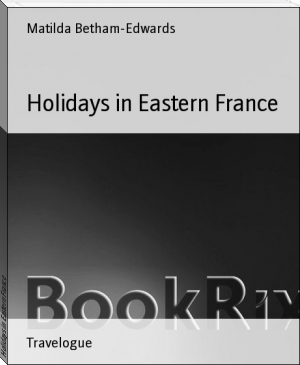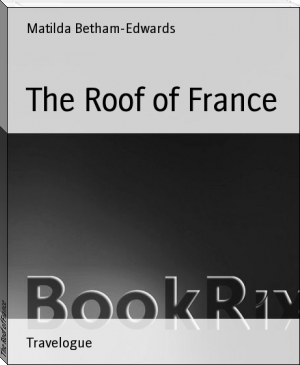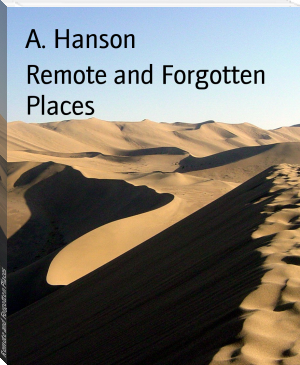Holidays in Eastern France by Matilda Betham-Edwards (free romance novels .txt) 📕

- Author: Matilda Betham-Edwards
Book online «Holidays in Eastern France by Matilda Betham-Edwards (free romance novels .txt) 📕». Author Matilda Betham-Edwards
All this will soon be changed with the new line of railway to lead from Besancon by way of St. Hippolyte and Morteau into Switzerland, and future travellers will be able to see this beautiful country with very little fatigue. As yet Franche Comte is an unknown region, and the sight of an English tourist is of rare occurrence. When we leave Pont de Roide, we once more enter the region of Protestantism, every village possessing a Protestant as well as a Catholic Church. The drive to Blamont is charming--a bit of Devonshire, with green lanes, dells, and glades, curling streams and smooth pastures. Blamont itself is romantically situated, crossing a verdant mountain side, its twin spires (Protestant and Catholic) rising conspicuously above the scattered villages; beyond these, the low mountain range of Blamont.
We have been all this time, be it remembered, geographically speaking in the Jura, though departmentally in the Doubs, the succession of rocks and mountains passed through forming part of the Jura range which vanishes in the green slopes of Blamont.
The next village, Glaye, is hardly less picturesque, and indeed all this neighbourhood would afford charming excursions for the pedestrian. The rest of our drive lay through an open, fairly-cultivated plain with little manufacturing colonies, thickly scattered among the rural population. In many cases the tall black chimneys spoil the pastoralness of the scene.
It was with extreme regret I took farewell of the friendly little Protestant town of Montbeliard, soon after this journey. I had entered it a few weeks before, a stranger, I quitted it amid the good wishes, hand-clasps, and affectionate farewells of a dozen kind friends. Two hours' railway journey, through a beautiful country, brought me to Besancon, where, as at Montbeliard, I received the warmest welcome, and felt at home at once.
CHAPTER VI.
BESANCON AND ITS ENVIRONS.
The hotels at Besancon have the reputation of being the worst in all France, but my kind friends would not let me try them. I found myself, therefore, all at once in the midst of all kinds of home comforts, domesticities, and distractions, with delightful cicerones in host and hostess, and charming little companions in their two children. This is the poetry of travel; thus to journey from one place to another, provided with introductory letters which open hearts and doors at every stage, and make each one the inauguration of a new friendship. I wish I could subjoin an illustration of "How I travelled through Franche-Comte," for my exploration of these regions was a succession of pic-nics--host, hostess, their English guest, Swiss nurse-maid, and two little fair-haired boys, being cosily packed in an open carriage; on the seat beside the driver, a huge basket, suggesting creature comforts, the neck of a wine bottle, and the spout of a tea-pot being conspicuous above the other contents. This is indeed the way I saw the beautiful valley of the Doubs, and not only the country round about Besancon, but the border-land of Switzerland and Savoy. The weather--we are in the first days of September--is perfect. The children, aged respectively eighteen months and three years and odd, are the best little travellers in the world, always going to sleep when convenient to their elders, and at other times quietly enjoying the shifting landscape; in fact, there is nothing to mar our enjoyment of regions as lovely as any it has ever been my good fortune to witness.
In consequence of the bad character of the Besancon hotels, even French tourists seldom break their journey here; but, on the opening of the new railway line into Switzerland, joining Besancon, Ornans, and Morteau, new and better hotels are sure to spring up. At present, wherever we go, we never, by any chance, meet the ubiquitous English traveller with his Murray, and my friends here say that, during a several years' residence in Besancon, they have never even yet seen such an apparition! Yet Franche-Comte, at present a terra incognita of tourists, abounds in all kinds of beauty; the sublime, the gracious, the grandiose, and the pastoral, rock, vast panoramas, mountain and valley, all are here; and all as free from the trace of the English and American tourist as the garden of Eden before Eve's trespass!
Besides these quieter beauties are some rare natural phenomena, such as the Glaciere de la Grace Dieu, near Baume-les-Dames, and the famous Osselle grottoes, both of which may be reached by railway. We preferred, however, the open carriages the basket and the tea-pot, and accordingly set off for the latter one superb morning in the highest spirits, which nothing occurred to mar. Quitting this splendid environment of Besancon, we drive for three hours amid the lovely valley of the Doubs, delighted at every bend of the road with some new feature in the landscape; then choosing a sheltered slope, unpacked our basket, lunched al fresco, with the merriest spirits, and the heartiest appetite. Never surely did the renowned Besancon pates taste better, never did the wine of its warm hill-sides prove of a pleasanter flavour! The children sported on the turf like little Loves, the air was sweet with the perfume of new-made hay. The birds sang overhead, and beyond our immediate pavilion of greenery, lay the curling blue river and smiling green hills. Leaving the children to sleep under the trees, and the horse to feed at a neighbouring mill--there is no kind of wayside inn here, so we have to beg a little hay from the miller or a farmer--we follow a little lad, provided with matches and candles to the entrance of the famous grottoes. Outside the sugar-loaf hill, so marvellously channelled and cased with stalactite formation, has nothing remarkable--it is a mere green height, and nothing more. Inside, however, as strange a spectacle meets our eyes as it is possible to conceive. To see these caves in detail, you must spend an hour or two in the bowels of the earth, but we were contented with half that time, for this underground promenade is a very chilly one, as in some places we were ankle deep in water. Each provided with a candle, we now follow our youthful guide, who was accompanied by a dog, as familiar as himself with the windings of these sombre subterranean palaces, for palaces they might be called. Sometimes the stalactite roofs are lofty, sometimes we have to bend our heads in order to pass from one vaulted chamber to another; here we have a superb column supporting an arch; here a pillar in course of formation, everywhere the strangest, most fantastic architecture, an architecture moreover that is the work of ages; one petrifying drop after another doing its apportioned work, column, arch, and roof being formed by a process so slow that the life-time of a human being hardly counts in the calculation. There is something sublime in the contemplation of this steady persistence of Nature, this undeviating march to a goal; and as we gaze upon the embryo stages of the petrifaction, stalagmite patiently lifting itself upward, stalactite as patiently bending down to the remote but inevitable union, we might almost fancy them sentient agents in the marvellous transformation. The stamens of a passion-flower do not more eagerly, as it seems, coil upwards to embrace the pistil; the beautiful stamina flower of the Vallisneria spiralis does not more determinately seek its mate than these crystal pendants covet union with their fellows below. Their perpetual bridals are accomplished after countless cycles of time, whilst meantime in the sunlit world outside, the faces of whole continents are being changed, and entire civilizations are formed and overthrown.
The feeble light projected by our four candles in these gloomy yet majestic chambers was not so feeble as to obscure the insignificant names of hundreds of individuals scrawled here and there. The great German philosopher Schopenhauer is at pains philosophically to explain the foolish propensity of travellers to perpetuate their names, or as it so seems to them. The Pyramids or Kentucky Caves do not impress their minds at all, but to see their own illustrious names John Brown and Tom Smith cut upon them, does seem a very interesting and important fact. The bones of the Cave bear and other gigantic animals have been formed here; but the principal tenants of these antique vaults are now the bats, forming huge black clusters in the roof. There is something eerie in their cries, but they are more alarmed than alarming; the lights disturbing them not a little.
Pleasant after even this short adventure into the regions of the nether-world, was the return to sunshine, green trees, the children, and the tea-pot! After calling it into requisition, we set off homewards, reaching Besancon just as the moon made its appearance, a large silver disc above the purple hills; and the next day, good luck still following us, we had a drive and pic-nic in the opposite direction, this time with a less ambitious programme. In fact, we were merely accepting a neighbour's invitation to a friendly dinner out of doors, a few miles from Besancon. This pic-nic is a fair sample of Franche-Comte hospitality; not only friends were invited but their guests, babies, servants, and "all that was in their house," the various parties being collected by the host in a waggonette. It was Sunday, and though I am here still in a strictly Protestant atmosphere, host and guests being Protestants, it was pleasant to find none of the Puritanism characterizing some sections of the Reformed Church in France. The Protestant pastor, indeed, to whose eloquent discourse I had listened that morning, was of the party; and it is quite a matter of course here to spend Sunday afternoons thus sociably and healthfully. The meeting-place was a rustic spot much resorted to by Bisontins on holidays, and easily reached from the little station of Roche on the railway line to Belfort. A winding path through a wood leads to the so-called Acier Springs, which, since the Roman epoch, have continued to supply Besancon with the delicious water we find here in such abundance. We have just such bits of wood, waterfalls, and mountains in North Wales, but seldom in September such unbroken sunshine to make a pic-nic exactly what it should be. It was warm enough for July, and young and old could disport themselves on the turf in perfect security.
As the afternoon wore on, numerous pleasure-parties, mostly belonging to the working-classes, found their way to the same pleasant spot, all amply provided with baskets of wine and provisions. Some went further in search of a little glade they could have to themselves, others took possession of nooks and corners in the open space where we tad just before dined so merrily. It was amusing to see how little attention these good people paid to us, or any other outsiders. Two or three of the women, fearing to tear their Sunday gowns in the wood, coolly took them off, hung them on the trees near, and as coolly re-made their toilette when their woodland rambles were over.
The train to Roche certainly brought in a





Comments (0)